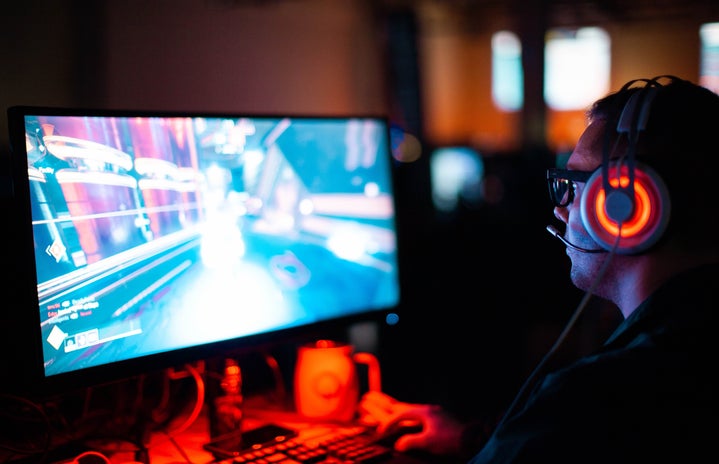Certainly, we have all dreamed of working directly with what we love; but what about when our passion is playing video games? Spending hours sitting in front of a computer or console playing electronic games is certainly not something that is most welcome – or at least it wasn’t until e-sports started to become popular. Since then, the competitive scene in the area has grown a lot and started to delight boys and girls who would like an opportunity.
- Bia
-
Bia “Biazik” Begnossi, for example, says that discovering the possibility of becoming a professional in the field was a watershed in her life. Today, the 21-year-old girl is a Valorant player for Vivo Keyd, and says she was once taxed as an addict.
– I spent a lot of time on the computer, my father and mother were always fighting with me because of it, because in the beginning I was really addicted. In the beginning it was just a game, I never imagined that there were professions involving video games. I never imagined it would become a job. Then in 2016 I started researching more about the games and saw that there was a professional female Counter Strike team. So kind of when I saw that I was like, “Oh my god, I want this.”
This desire, however, was not in line with what his parents had foreseen for his future: a college with formal employment.
– The biggest interest of my family was: “What college are you going to go to”, you know? So I kind of didn’t have that much time to spend on games because of this issue. I dropped games, sold my computer and focused on college, but I still kept thinking about it. I didn’t know how to tell my parents that I wanted to drop out of college to focus on that, you know? Few parents would understand this decision.
- Aninha
-
The story turned out to be a little different for Ana “Aninha” Luiza, a 23-year-old girl who is also a Valorant athlete for Vivo Keyd. She is on the same team as Bia, but reports that she had much greater support within her family to continue in the e-sports area.
– At first my father thought it was really weird, because I was a woman playing a shooting game… He was kind of like that, but he was the first to support me. He used to say: “Wow, that’s cool, you’re a 10” and such. My mother was a little like: “Oh no, I don’t think so, focus on studies”, but now she goes out telling everyone that I play professionally.
The two friends met playing Counter Strike, and report that before that they had never met other girls in the game: only men spoke in voice chat, and even players with the female nickname did not speak even through text chat.
But the similarities between the duo continue: both came to leave games aside to attend law school, but eventually ended up returning to practice. In the end, the two closed the course and started dedicating themselves exclusively to e-sports – in Aninha’s case, however, the idea came from her own mother.
– My mother said: “Ana, you don’t think it’s better to stop it for now? Because you’ll focus more”, and I said: “Oh, I think so too”.
- Two realities, one dream
-
Biazik, on the other hand, says that it took longer to convince her mother that the decision to leave her studies aside had been correct: it took a few months of continuous efforts until the family agreed with the girl’s undertaking, which resulted in a contract with one of the biggest clubs of electronic sports in Brazil.
– My mother wanted me to stop playing before getting my job at Vivo Keyd, she wanted me to stop playing to help her with some things at home, because I think the quarantine was a little complicated for everyone. Even so, I told her to believe that it would work. It took two months and I got this opportunity. I think the biggest complication of this trajectory is having the support of parents, family, because the only one who really supported me in this matter was my cousin, who called me to play.
The two got the opportunity to play for Vivo Keyd together, but that only happened because of an unforeseen event. The organization had promoted a Valorant championship to find new female talent, the VK Girls Championship, and Bia’s team made it to the final after defeating Ana’s team. Bia couldn’t play – and Ana was promptly asked to replace her. She recalls that, despite the invitation made at the last minute, she was the best player in the match.
– I used to play on that very fake team, you know, I called the girls just to play, without a bond. And Bia’s invitation was on a very random night, and then I went to play, right, a normal game. But we were the third team that managed to beat Gamelanders, we made two to zero on them and I made 63 kills from Sage. I was MVP, and then the next day Vivo Keyd wanted to meet with me. A week passed, and they already made my contract.
Although the team of the pair of friends got the golden opportunity through the championship, not all girls are so lucky. In the traditional mixed talent bank spreadsheets, it is not common to find the names of women – whether among players, narrators, coaches or even psychologists. When analyzing the professional scene itself, finding women who stand out is a difficult task. It was the combination of these facts that led Flávia Naoshi to create an exclusively female talent spreadsheet, the Planilha Spike Girls, which is geared towards Valorant professionals.
- Flávia Naoshi and the “Planilha Spike Girls”
-
– I saw the community getting together and making these spreadsheets for the players. I went to see and there were very few players, and I thought: “Is it because they don’t want to be there? Doesn’t there really have a female player? Or is it because they are not having the opportunity to reach the people who are the heads of the project?” I felt that this was a lot, because when I launched the spreadsheet there were a lot of mines that I had never seen in the spreadsheets, from casters, streamers, many girls anyway. There were a lot of people who wanted to be included, wanted to feel safe to come and ask to participate.
The worksheet comprises four categories of in-game roles: players, casters, staff and streamers. There, data such as the name of the professionals, the main functions performed, forms of contact and even their portfolio are registered. Flávia, then, is responsible for disseminating the spreadsheet both among players and among companies that may be interested in hiring more women to compose the internal teams.
– The purpose of the spreadsheet is to centralize the names and contacts of women who are interested in becoming a professional and entering the market. If any company or organization is interested in hiring, I’ll go and say: “There’s this spreadsheet that if you can take a closer look, there are many professionals who can match your ideas. If you want to hire a woman for your team, a woman who is interested in entering the market, take a look at the spreadsheet, we have everything here.”
During the construction of the spreadsheet, however, Flávia realized that many of the professionals who came to her reported situations in which they were harassed when trying to enter other spreadsheets, and they say that they even left opportunities aside for fear of being compared to men or exposed.
– I was very sad with the amount of girls who wanted to be in the mixed sheets, but weren’t because they were somehow harassed. They often came up to me and confessed something more personal, like: “I really wanted to join the spreadsheet that the players have but I was embarrassed, because I was afraid of being treated badly. I saw so many men there in the spreadsheet that I was thinking, can I be there?”
You can find the spreadsheet here:https://docs.google.com/spreadsheets/d/1Pw5ccppI96kzAXMRZZMxJWCV37hXS_le-JSlnssLrdw/edit?usp=drivesdk
The problem with hostility from middle men is something also mentioned by Aninha. She says that any error in the game or simple refusal to do something that was ordered by random teammates are pretexts for them to be criticized and even attacked, and that this made her prefer to play anonymously.
– In Valorant you can hide your nick during the game, and after a while I started to do this because the men saw that it was a girl and kept shooting at my body, I killed and said something in the chat. I was starting to get annoyed about it, so I cheated on my nick.
The situation only changes when, at the end of the game, the players realize that they belong to Vivo Keyd. At this point, she reports that the name-calling turns into apologies.
– There was a game that a kid called me by all sorts of names. When the game was over, he saw that I was from Vivo Keyd and he was scared, so he went and added me. I accepted the friend request, and he came and said: “Damn, I’m sorry, I didn’t know you were from Vivo Keyd”, and I said: “Brother, even if I was a bread and egg, you shouldn’t treat a woman like that. Dude, you called me a slut.”
Bia says that the same situation happens to her during matches, and that it is common for several players who previously offended her to apologize when identifying their organization. Unlike Ana, she says she doesn’t make a point of maintaining sympathy when answering these players, and opines that the apologies are not sincere.
– The guys are scared right? You almost always see girls on Twitter talking about guys cursing, and like, they see it’s women playing and they start talking a lot of insults. Then they think: “Wow, the girl plays on Vivo Keyd, if she posts something I’m screwed”. There always is, they say things and then regret it, afraid to be exposed on Twitter.
Despite this, both players agree that Valorant’s community has been quite welcoming: unlike its older brother, League of Legends – a game released by the same company, Riot Games, in 2009 -, the FPS game that debuted in 2020, it has already arrived with many plans for the female scenario, as recalls Ana, who started practicing the game early on.
– Riot invested much more in making Valorant a more welcoming scenario for women than in League of Legends, so much so that we wondered if they would invest in Valorant’s female scenario because in LoL there was no official Riot championship, sponsored by Riot. Just this year when Riot started talking about it, it invested around 300 thousand dollars in the female scene. It’s a shame that LoL doesn’t have the same investment, because that’s where there’s more asshole men, even in championship broadcasts.
If inside games it’s already difficult to deal with boring situations and disrespect from the community, imagine outside of them. In an area where playing and talking about e-sports is still a challenge for women, professionals who managed to circumvent the imposed rules are trying to change that and bring to reality that outside the consoles, women also know how to play.
*This article was produced as part of the book-report “Lugar de Mulher é como Tank”, written by Mirella Agnes Freitas and Yasmin Luara.
——————————————————————–
The article above was edited by Thays Avila.
Liked this type of content? Check Her Campus Cásper Líbero home page for more!



